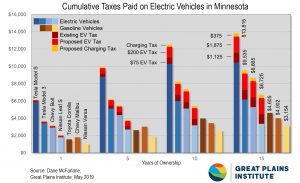Minnesota Legislature at a Crossroads – Accelerate Electric Vehicle Benefits in the State or Hit the Brakes
April 16, 2019 | Brendan Jordan | Policy

Minnesota’s emerging electric vehicle (EV) industry is at an important pivot point. After years of effort by many people and organizations, the conditions are right for growth in EV adoption with the numerous economic and clean air benefits that come with it. This is an update on the status of EV proposals currently in play at the Minnesota Legislature.
The takeaways:
- There is bipartisan support for provisions in the Minnesota House Transportation Bill (HF 2208) that offer rebates of $2,500 for new EVs and $500 rebates for used EVs.
- HF 2208 invests $2.5 million in public EV charging stations and in EV transit and school busses.
- Interest in EVs also exists in the Republican-controlled Senate with a proposed investment of $1.5 million into a revolving loan program to support installation of EV charging infrastructure by businesses and a proposed investment of $8 million in high-speed public EV chargers.
- EV taxes are proposed by Senator Jeff Howe (R) at $200 for EVs (up from the current $75) and $100 for plug-in hybrids and adds a tax on public EV charging.
- Advocates for EV taxes claim they are addressing a perceived unfairness with EVs not paying gas tax, but analysis shows that EV drivers contribute more to the Highway User Tax Distribution Fund than drivers of equivalent gasoline-powered vehicles.
- As evidenced in other states, over-taxing EVs today will discourage adoption and slow the development of this new market, placing Minnesota at a disadvantage when it comes to the economic and clean air benefits.
Minnesota legislators on both sides of the political aisle are supporting policies and investments that will complement the efforts of Minnesotans around the state—from consumers to business and community leaders—to promote EV adoption and infrastructure. The House omnibus jobs and economic development, energy and climate, and telecommunications policy and finance bill (HF 2208) contains a number of examples. This bill supports the adoption of EVs in the following ways:
- Invests $10.4 million in a point-of-sale rebate program, enabling $2,500 rebates for new EVs and $500 rebates for used EVs that were not previously registered in Minnesota. Notably, EVs that sell for more than $60,000 are not eligible, taking away the potential appearance of subsidizing luxury cars. Minnesota would join 14 other states with similar incentives and 34 states with a broader variety of incentives that also include things like high-occupancy vehicle (HOV) access for EVs and tax incentives. The original bill creating this provision (HF 2233) was authored by Representative Jamie Long (D) and co-authored by Representative Pat Garofalo (R), demonstrating bipartisan support for this idea.
- Invests $2.5 million in public EV charging stations. This is a significant increase over the $1.7 million that the Minnesota Pollution Control Agency is already investing and will go a long way towards enabling travel throughout the state of Minnesota in an EV. This provision has bipartisan support.
- Includes $8 million to support investment in EV buses by Metro Transit—which recently announced a goal to move towards 100 percent EV buses in its fleet by 2040—as well as $500,000 for EV school bus grants. This will allow the state to build on the successful demonstration of EV school bus technology by Schmitty & Sons, Dakota Electric Association, and Great River Energy. These provisions were originally authored by Representative Zach Stephenson (D) as HF 2618 (school buses) and HF 1755 (transit buses).
There is broad support for HF 2208 from Drive Electric Minnesota’s Policy Committee, which includes utilities (investor-owned, co-ops, municipal), automakers, auto dealers, clean air organizations, energy NGOs, and EV owners.
Interest in EVs also exists in the Republican-controlled Senate. SF 2342, authored by Senator David Osmek (R), invests $1.5 million into a revolving loan program to support installation of EV charging infrastructure by businesses. Senator David Senjem (R) has also authored a provision allocating $ 8 million for EV charging infrastructure, in SF 1905.
Unfortunately, there are some senators who seem determined to slow down progress on creating an EV industry in the state. Senator Jeff Howe’s (R) EV tax proposal, which originally established a $250 special annual EV tax and a $125 annual tax for hybrid vehicles, was incorporated last week into a major Senate transportation finance and policy omnibus bill, SF 1093. This bill has lower but still unacceptable taxes of $200 for EVs and $100 for plug-in hybrids. The bill also adds a new kWh tax at EV charging stations. Advocates for EV taxes claim that they are addressing a perceived unfairness with EVs not paying gas tax, but our analysis (see Figure 1) shows that EV owners would pay thousands of dollars more towards highway funding if this provision passed, not to mention additional taxes for EV charging. If these provisions pass into law, they will slow adoption and endanger potential future investments in growing this industry and establishment of important infrastructure in Minnesota.
Figure 1: Electric vehicle owners pay more per year than comparable vehicle owners in registration tax and motor vehicle sales tax. This more than makes up for the motor fuel tax that they do not pay.

Note: Gas taxes and the EV charging tax are estimated based on driving 10,000 miles per year, which is the average vehicles miles traveled per capita in Minnesota.
Clear divisions have emerged regarding these unfair and unwise new taxes. During the April 10 hearing of the Senate Transportation Finance and Policy Committee, Senator Osmek introduced an amendment to eliminate the EV tax provisions from the omnibus transportation finance and policy bill. He was joined by Senator David Senjem (R) and a number of Democrats. The amendment lost on a tie vote (7-7), meaning that the EV taxes only narrowly stayed in the bill. The state of Georgia’s experience tells us that there are real stakes in this debate. Georgia offered a rebate worth $5,000 per EV sold through 2015, resulting in an EV share in Atlanta at four times the national average. In 2015, the legislature let the rebates expire and added a $200 annual EV tax. Sales plummeted to well below the national average. Overall, there are more reasons to be optimistic than pessimistic. The provisions in HF 2208 would make a difference in supporting this emerging industry in Minnesota. There has never been such an ambitious EV bill in Minnesota. It is encouraging to see bipartisan support for EVs, and support for EV bills in both the Republican-controlled Senate and the DFL-controlled house. It is also a great sign of progress that there is emerging bipartisan opposition to EV taxes that would discourage the growth of this new industry. Of course, it is disappointing to see EV taxes continuing to move forward. With just a bit over a month of the legislative session remaining, a coalition of Minnesota’s electric vehicle champions, Drive Electric Minnesota (which is facilitated by GPI), continues to encourage the good policy and discourage the bad, hoping more leaders realize the economic and environmental benefits of EV-forward policies that will steer Minnesota in a positive direction for the future.
Don’t miss updates from our Transportation and Fuels Program (and more!)–sign up for our monthly newsletter.
Photo by Brett Patzke on Unsplash
